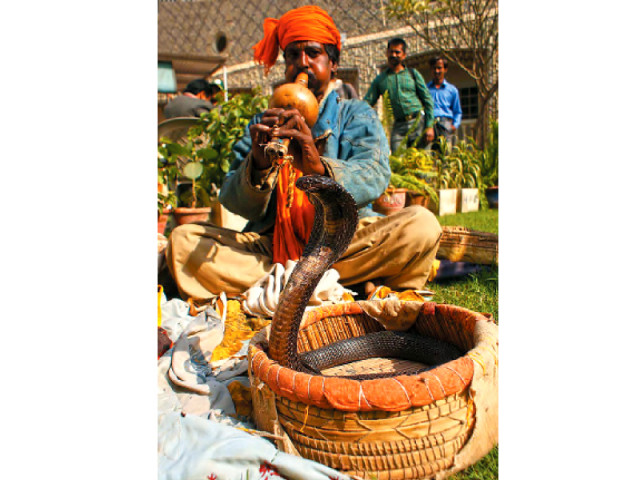Working on wonders: Cryobiology lab to open at DUHS
Clinical trials for antivenins have already been completed at the lab.

This picture shows a snake charmer performing with a Pakistan Black Cobra, which has now become relatively difficult to find in the wild. Other deadly species found in Sindh include the Common Krait and the Chain Viper. PHOTO: FILE
A cryobiology laboratory is slated to open soon at the Ojha campus of the Dow University of Health Sciences (DUHS) where venom will be milked from different species of snakes, frozen and then injected into horses.
Though this may sound like a scene from a bizarre science fiction movie, it is actually an age-old process through which antivenin - the serum to counter the effects of snake bites - is produced. A snake house has already been constructed on campus where researchers have painstakingly been extracting venom from live reptiles and conducting experiments on horses.
According to one estimate, about 20,000 people are bitten by snakes across Pakistan. Roughly 70 per cent of the victims die as they don’t seek treatment right away or because government hospitals don’t stock enough antivenin.
According to reports published by the health department, Tharparkar is one of the worst-affected areas of Sindh. But the problem isn’t just circumscribed to rural spots. Last June, a 20-year-old student of Liaquat University of Medical and Health Sciences in Jamshoro died 72 hours after being bitten by a snake which had somehow snuck into her dormitory room where she was sleeping.
Some of the poisonous species found in Sindh include the Common Krait, the Sindhi Krait, Chain Viper, and the Spectacled Cobra. The Saw-scaled Viper, which is one of the most poisonous and aggressive snakes in the world, is also found in the province.
Different antivenins are required to counter the effects of bites from different species. This is why serums imported from abroad, which are created from the venom of species found there, may not be potent to treat cases in Pakistan. The new lab, which will be completed in four months, will join the likes of the National Institute of Health in Islamabad in producing serum for snake bites. A cryobiology lab is required to create antivenin as during its production, it must be frozen to sub-zero temperatures - up to minus 20˚C. The researchers at the DUHS lab completed research on snake bites last year and now clinical trials of serum produced there has also been completed. Separate serums will be produced to counter bites from different indigenous species of snakes. The snake experts said that deaths from bites will plummet as soon as antivenin is produced locally.
Also on the agenda
The researchers at the new laboratory will also work on creating vaccines for rabies - a disease which attacks the neurological system. The illness, which is transmitted to humans through bites from infected canines, has afflicted parts of rural Sindh in the past because of the presence of pye-dogs. They also hope to produce vaccines for hepatitis B, snake bites and cancer. Vaccines for polio and influenza will also be produced in the future, they said, adding that the vaccines would be approved by the World Health Organisation and FDA.
Published in The Express Tribune, April 12th, 2013.



















COMMENTS
Comments are moderated and generally will be posted if they are on-topic and not abusive.
For more information, please see our Comments FAQ